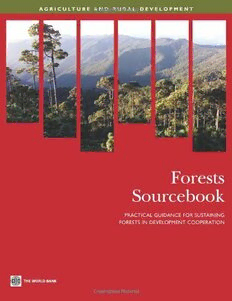Download Forests Sourcebook: Practical Guidance for Sustaining Forests in Development Cooperation (Agriculture and Rural Development Series) PDF Free - Full Version
Download Forests Sourcebook: Practical Guidance for Sustaining Forests in Development Cooperation (Agriculture and Rural Development Series) by World Bank in PDF format completely FREE. No registration required, no payment needed. Get instant access to this valuable resource on PDFdrive.to!
About Forests Sourcebook: Practical Guidance for Sustaining Forests in Development Cooperation (Agriculture and Rural Development Series)
In 2002 the Bank adopted a revised Forests Strategy and Operational Policy that allows the Bank to more proactively engage in the forest sector to help attain the goal of poverty reduction without jeopardizing the environmental values intrinsic to sustainability. The strategy is founded on three equally important and inter-related pillars: Harnessing the potential of forests to reduce poverty in a sustainable manner; Integrating forests more effectively into sustainable development; and Protecting vital local and global environmental services and values. Addressing these three pillars together makes the World Bank s work in the forest sector complex and multifaceted. It is not only about growing or protecting trees but also involves a complex interaction of policy, institutions, and incentives. Its approach embodies a multi-sector approach that addresses cross-sector issues and takes into account the impacts of activities, policies, and practices outside the sector on forests and people who depend on forests for their livelihoods. The purpose of the Forests Sourcebook is to be a resource for Bank clients, task managers and other stakeholders in designing and implementing projects in line with the Forest Strategy. The Sourcebook draws on experiences from within and outside the Bank in using innovative approaches to addressing the three pillars of the Strategy. The Sourcebook is divided into two parts: Part one contains seven modules looking at priority themes in the sector. It covers topics associated with: how forests can contribute to poverty reduction, engaging private sector, meeting the growing demand for wood, optimizing forest functions at the landscape level, improving forest governance, mainstreaming forest considerations in macro policy dialogue, and monitoring forest sector activities. The second part provides some guidance on implementing the World Bank s safeguard policies that are relevant to forests.
Detailed Information
| Author: | World Bank |
|---|---|
| Publication Year: | 2008 |
| ISBN: | 9780821371640 |
| Pages: | 402 |
| Language: | English |
| File Size: | 2.215 |
| Format: | |
| Price: | FREE |
Safe & Secure Download - No registration required
Why Choose PDFdrive for Your Free Forests Sourcebook: Practical Guidance for Sustaining Forests in Development Cooperation (Agriculture and Rural Development Series) Download?
- 100% Free: No hidden fees or subscriptions required for one book every day.
- No Registration: Immediate access is available without creating accounts for one book every day.
- Safe and Secure: Clean downloads without malware or viruses
- Multiple Formats: PDF, MOBI, Mpub,... optimized for all devices
- Educational Resource: Supporting knowledge sharing and learning
Frequently Asked Questions
Is it really free to download Forests Sourcebook: Practical Guidance for Sustaining Forests in Development Cooperation (Agriculture and Rural Development Series) PDF?
Yes, on https://PDFdrive.to you can download Forests Sourcebook: Practical Guidance for Sustaining Forests in Development Cooperation (Agriculture and Rural Development Series) by World Bank completely free. We don't require any payment, subscription, or registration to access this PDF file. For 3 books every day.
How can I read Forests Sourcebook: Practical Guidance for Sustaining Forests in Development Cooperation (Agriculture and Rural Development Series) on my mobile device?
After downloading Forests Sourcebook: Practical Guidance for Sustaining Forests in Development Cooperation (Agriculture and Rural Development Series) PDF, you can open it with any PDF reader app on your phone or tablet. We recommend using Adobe Acrobat Reader, Apple Books, or Google Play Books for the best reading experience.
Is this the full version of Forests Sourcebook: Practical Guidance for Sustaining Forests in Development Cooperation (Agriculture and Rural Development Series)?
Yes, this is the complete PDF version of Forests Sourcebook: Practical Guidance for Sustaining Forests in Development Cooperation (Agriculture and Rural Development Series) by World Bank. You will be able to read the entire content as in the printed version without missing any pages.
Is it legal to download Forests Sourcebook: Practical Guidance for Sustaining Forests in Development Cooperation (Agriculture and Rural Development Series) PDF for free?
https://PDFdrive.to provides links to free educational resources available online. We do not store any files on our servers. Please be aware of copyright laws in your country before downloading.
The materials shared are intended for research, educational, and personal use in accordance with fair use principles.

